实验3:OpenFlow协议分析实践
一、基本要求
1.搭建拓扑
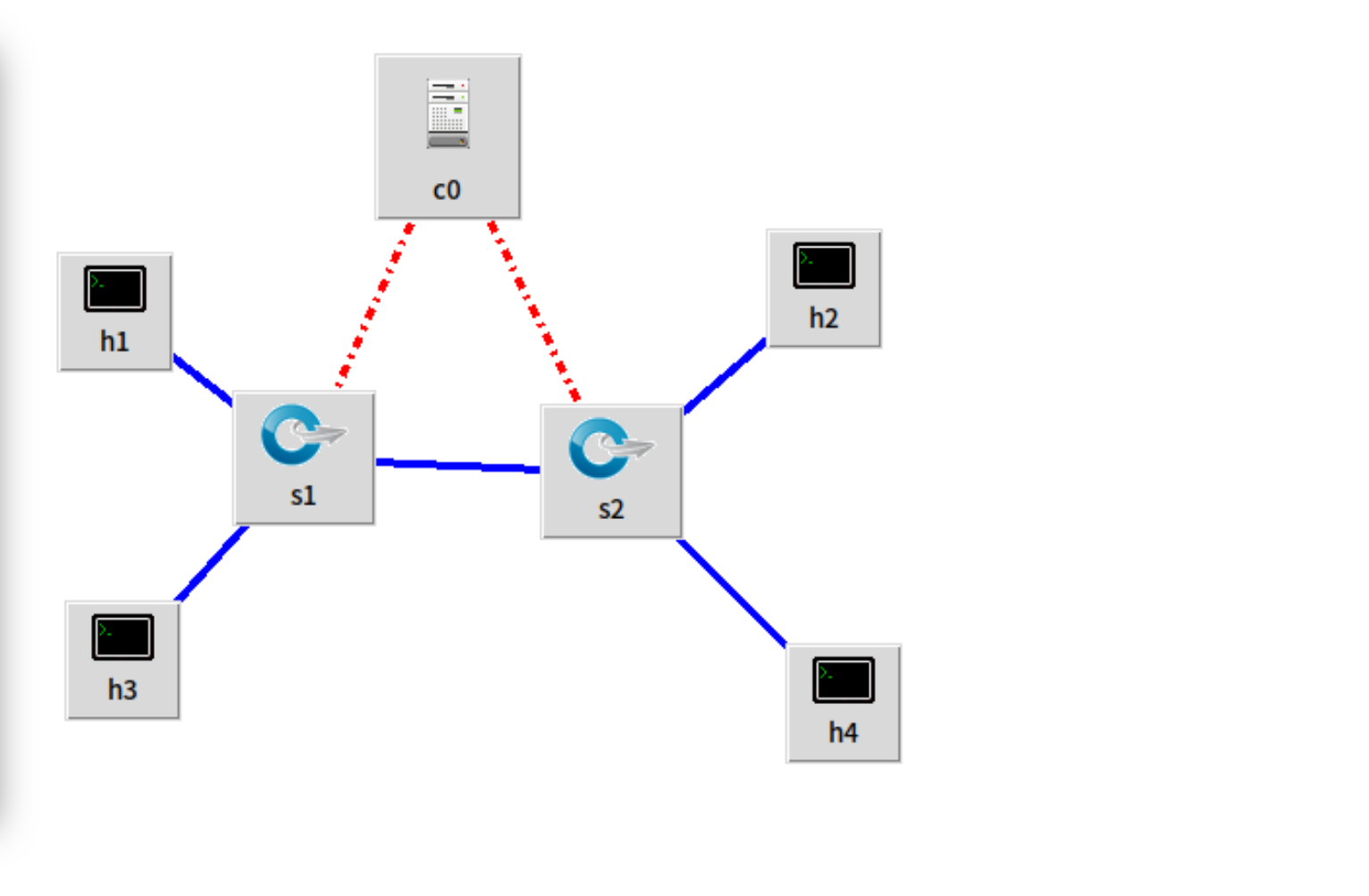
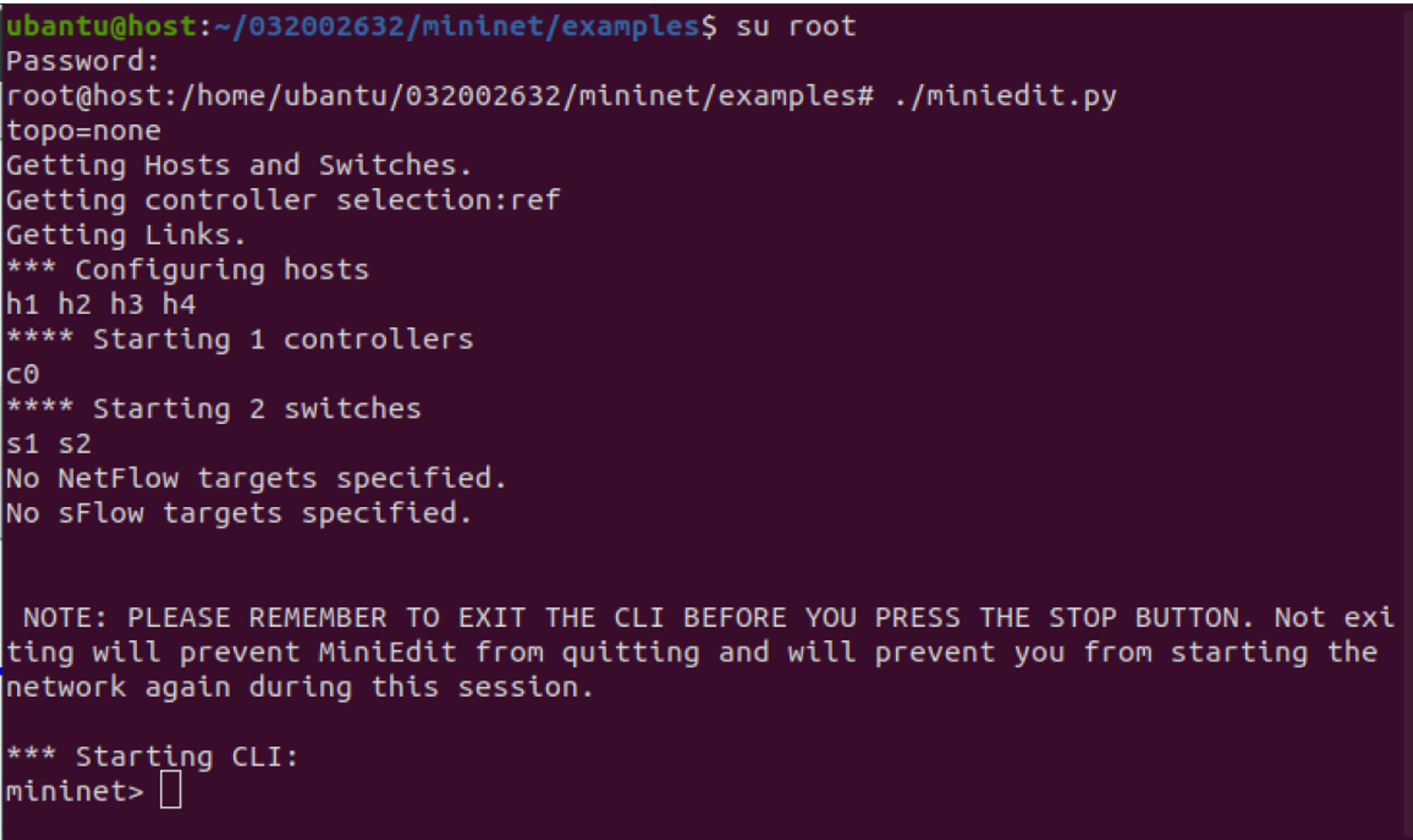
2.抓包结果
HELLO
控制器6633端口(我最高能支持OpenFlow 1.0) ---> 交换机57830端口

交换机57830端口(我最高能支持OpenFlow 1.3) ---> 控制器6633端口
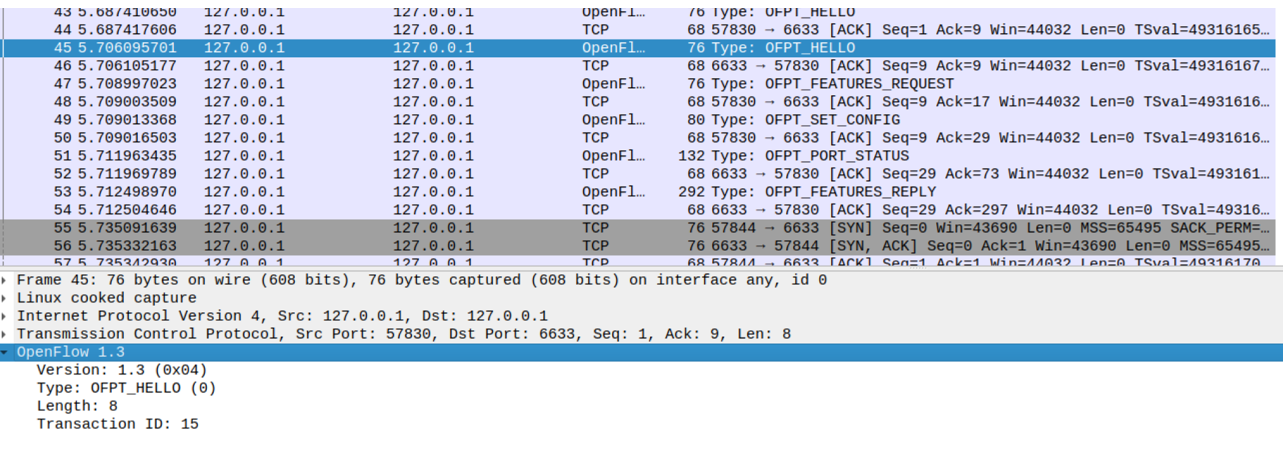
双方建立连接,并使用OpenFlow 1.0
FEATURES_REQUEST
控制器6633端口(我需要你的特征信息) ---> 交换机57380端口
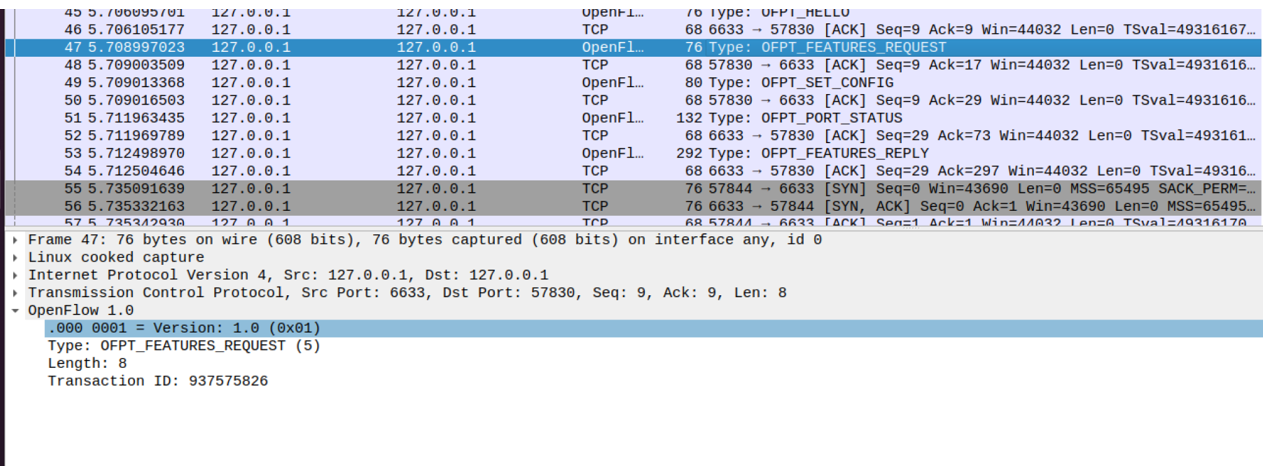
SET_CONFIG
控制器6633端口(请按照我给你的flag和max bytes of packet进行配置) ---> 交换机57830端口

PORT_STATUS
当交换机端口发生变化时,告知控制器相应的端口状态
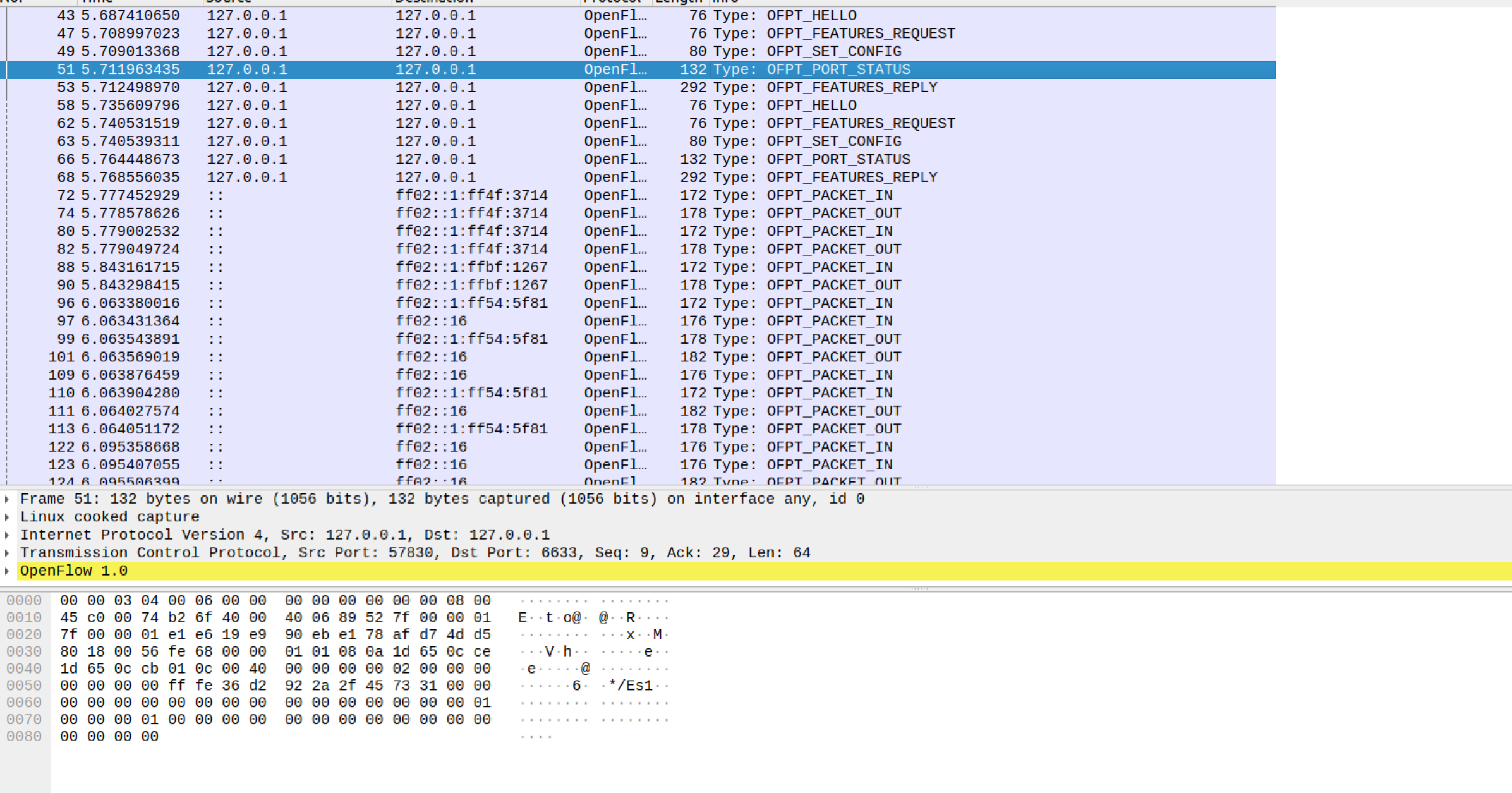
FEATURES_REPLY
交换机57830端口(这是我的特征信息,请查收) ---> 控制器6633端口
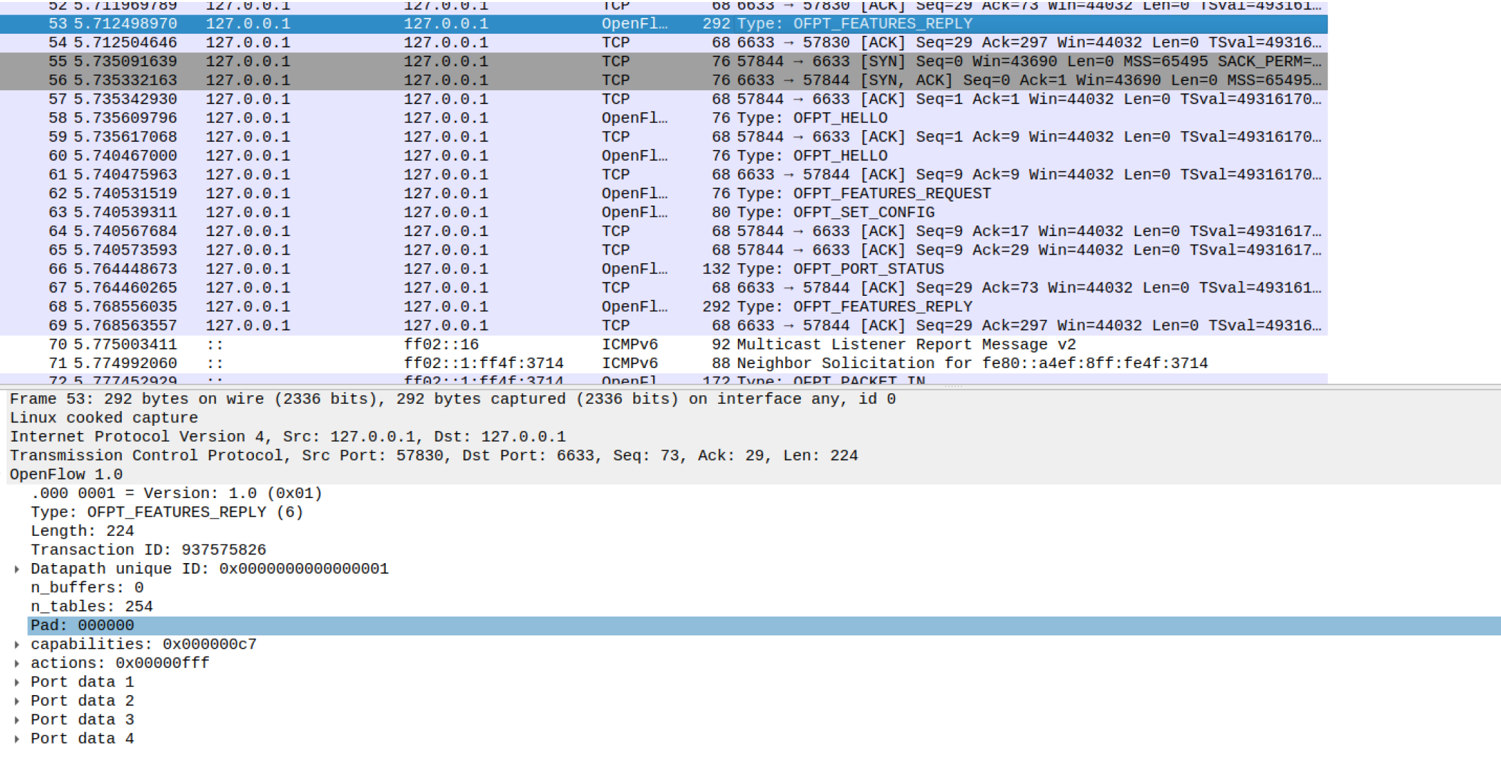
PACKET_IN
交换机57830端口(有数据包进来,请指示)--->控制器6633端口
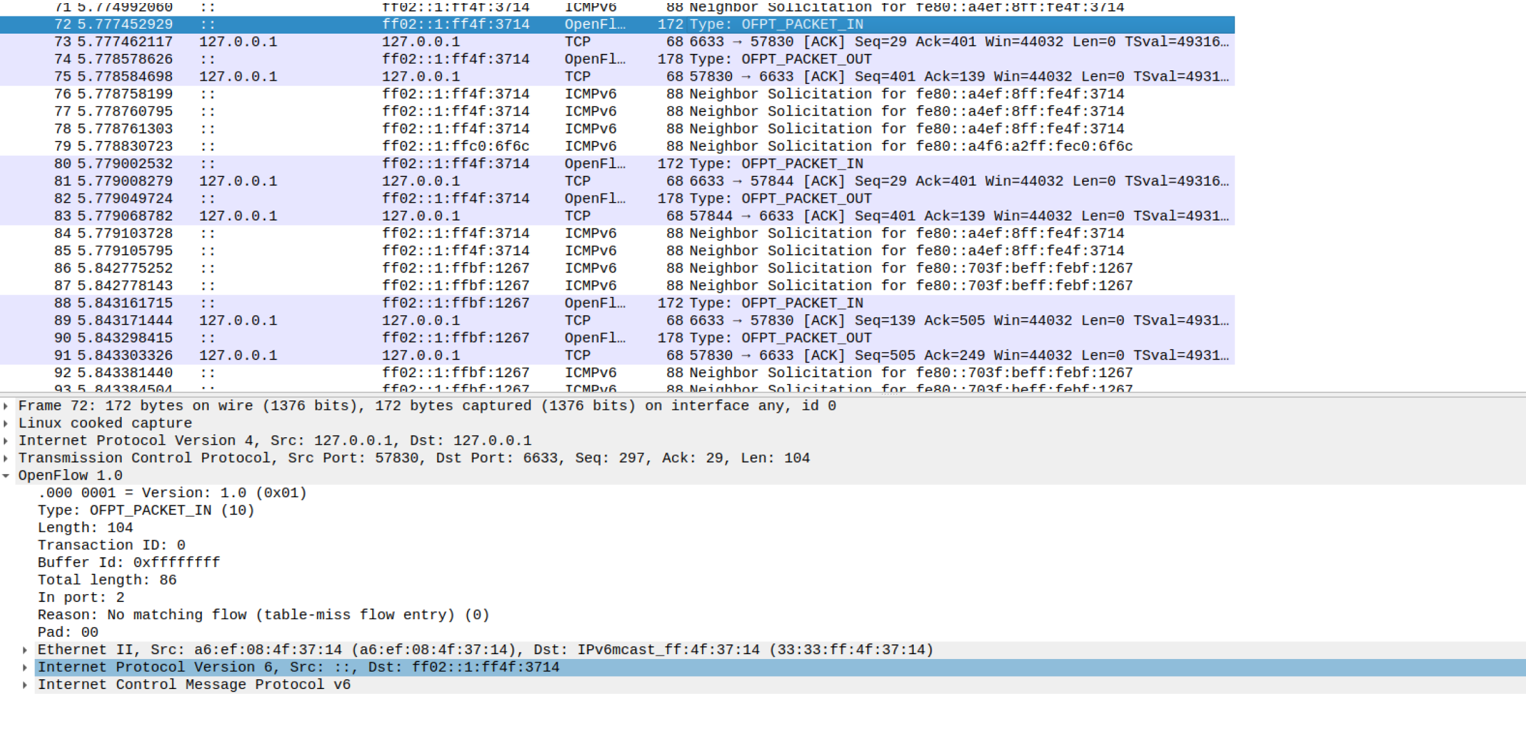
Flow_mod
分析抓取的flow_mod数据包,控制器通过6633端口向交换机57830端口下发流表项,指导数据的转发处理
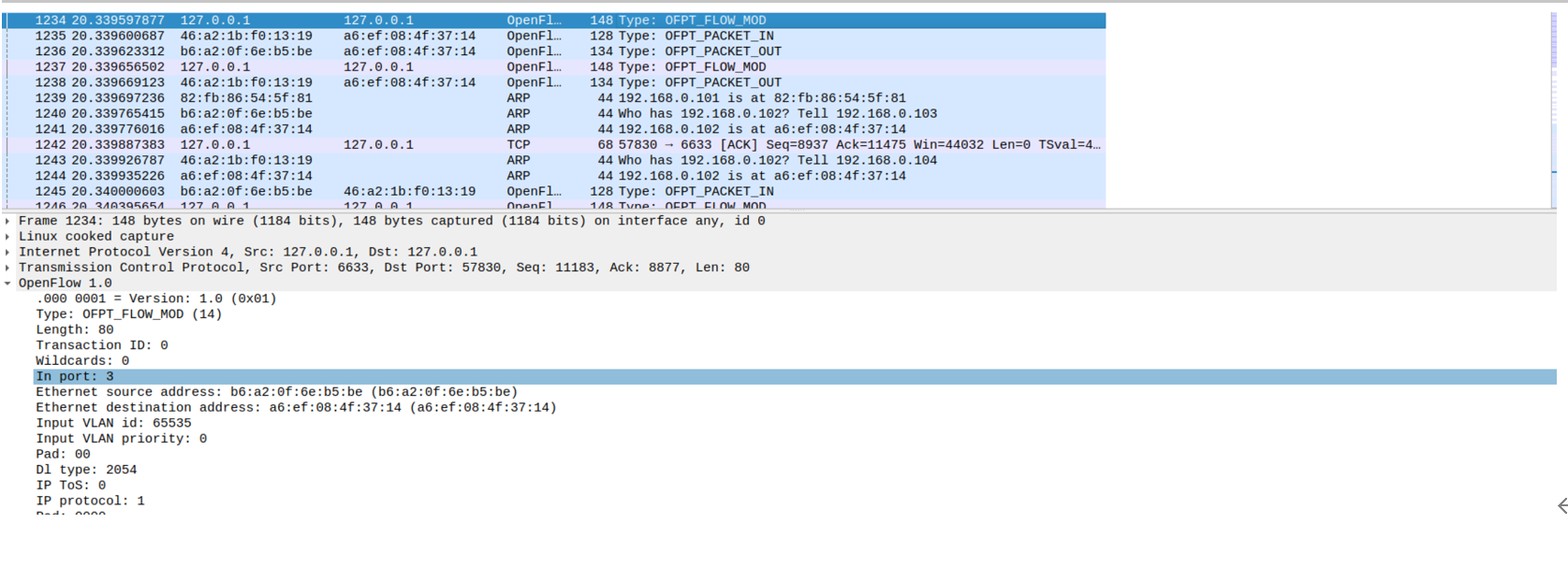
PACKET_OUT
控制器6633端口--->交换机57830端口(请按照我给你的action进行处理)

交互图

3.回答问题:交换机与控制器建立通信时是使用TCP协议
二、进阶要求 OpenFlow源码数据结构
Openflow数据报头部
/* Header on all OpenFlow packets. */
struct ofp_header {
uint8_t version; /* OFP_VERSION. */
uint8_t type; /* One of the OFPT_ constants. */
uint16_t length; /* Length including this ofp_header. */
uint32_t xid; /* Transaction id associated with this packet.
Replies use the same id as was in the request
to facilitate pairing. */
};
OFP_ASSERT(sizeof(struct ofp_header) == 8);
传输消息类型汇总
enum ofp_type {
/* Immutable messages. */
OFPT_HELLO, /* Symmetric message */
OFPT_ERROR, /* Symmetric message */
OFPT_ECHO_REQUEST, /* Symmetric message */
OFPT_ECHO_REPLY, /* Symmetric message */
OFPT_VENDOR, /* Symmetric message */
/* Switch configuration messages. */
OFPT_FEATURES_REQUEST, /* Controller/switch message */
OFPT_FEATURES_REPLY, /* Controller/switch message */
OFPT_GET_CONFIG_REQUEST, /* Controller/switch message */
OFPT_GET_CONFIG_REPLY, /* Controller/switch message */
OFPT_SET_CONFIG, /* Controller/switch message */
/* Asynchronous messages. */
OFPT_PACKET_IN, /* Async message */
OFPT_FLOW_REMOVED, /* Async message */
OFPT_PORT_STATUS, /* Async message */
/* Controller command messages. */
OFPT_PACKET_OUT, /* Controller/switch message */
OFPT_FLOW_MOD, /* Controller/switch message */
OFPT_PORT_MOD, /* Controller/switch message */
/* Statistics messages. */
OFPT_STATS_REQUEST, /* Controller/switch message */
OFPT_STATS_REPLY, /* Controller/switch message */
/* Barrier messages. */
OFPT_BARRIER_REQUEST, /* Controller/switch message */
OFPT_BARRIER_REPLY, /* Controller/switch message */
/* Queue Configuration messages. */
OFPT_QUEUE_GET_CONFIG_REQUEST, /* Controller/switch message */
OFPT_QUEUE_GET_CONFIG_REPLY /* Controller/switch message */
};
发送失败消息类型
enum ofp_error_type {
OFPET_HELLO_FAILED, /* Hello protocol failed. */
OFPET_BAD_REQUEST, /* Request was not understood. */
OFPET_BAD_ACTION, /* Error in action description. */
OFPET_FLOW_MOD_FAILED, /* Problem modifying flow entry. */
OFPET_PORT_MOD_FAILED, /* Port mod request failed. */
OFPET_QUEUE_OP_FAILED /* Queue operation failed. */
};
OFTP_HELLo
struct ofp_header {
uint8_t version; /* OFP_VERSION. */
uint8_t type; /* One of the OFPT_ constants. */
uint16_t length; /* Length including this ofp_header. */
uint32_t xid; /* Transaction id associated with this packet.
Replies use the same id as was in the request
to facilitate pairing. */
};
/* OFPT_HELLO. This message has an empty body, but implementations must
* ignore any data included in the body, to allow for future extensions. */
struct ofp_hello {
struct ofp_header header;
};
发送失败:
enum ofp_hello_failed_code {
OFPHFC_INCOMPATIBLE, /* No compatible version. */
OFPHFC_EPERM /* Permissions error. */
};
OFPT_FEATURES_REQUEST
struct ofp_phy_port {
uint16_t port_no;
uint8_t hw_addr[OFP_ETH_ALEN];
char name[OFP_MAX_PORT_NAME_LEN]; /* Null-terminated */
uint32_t config; /* Bitmap of OFPPC_* flags. */
uint32_t state; /* Bitmap of OFPPS_* flags. */
/* Bitmaps of OFPPF_* that describe features. All bits zeroed if
* unsupported or unavailable. */
uint32_t curr; /* Current features. */
uint32_t advertised; /* Features being advertised by the port. */
uint32_t supported; /* Features supported by the port. */
uint32_t peer; /* Features advertised by peer. */
};
OFP_ASSERT(sizeof(struct ofp_phy_port) == 48);
/* Switch features. */
struct ofp_switch_features {
struct ofp_header header;
uint64_t datapath_id; /* Datapath unique ID. The lower 48-bits are for
a MAC address, while the upper 16-bits are
implementer-defined. */
uint32_t n_buffers; /* Max packets buffered at once. */
uint8_t n_tables; /* Number of tables supported by datapath. */
uint8_t pad[3]; /* Align to 64-bits. */
/* Features. */
uint32_t capabilities; /* Bitmap of support "ofp_capabilities". */
uint32_t actions; /* Bitmap of supported "ofp_action_type"s. */
/* Port info.*/
struct ofp_phy_port ports[0]; /* Port definitions. The number of ports
is inferred from the length field in
the header. */
};
OFP_ASSERT(sizeof(struct ofp_switch_features) == 32);
OFPT_SET_CONFIG
struct ofp_switch_config {
struct ofp_header header;
uint16_t flags; /* OFPC_* flags. */
uint16_t miss_send_len; /* Max bytes of new flow that datapath should
send to the controller. */
};
OFPT_PORT_STATUS
struct ofp_port_status {
struct ofp_header header;
uint8_t reason; /* One of OFPPR_*. */
uint8_t pad[7]; /* Align to 64-bits. */
struct ofp_phy_port desc;
};
OFPT_FEATURES_REPLY
struct ofp_switch_features {
struct ofp_header header;
uint64_t datapath_id; /* Datapath unique ID. The lower 48-bits are for
a MAC address, while the upper 16-bits are
implementer-defined. */
uint32_t n_buffers; /* Max packets buffered at once. */
uint8_t n_tables; /* Number of tables supported by datapath. */
uint8_t pad[3]; /* Align to 64-bits. */
/* Features. */
uint32_t capabilities; /* Bitmap of support "ofp_capabilities". */
uint32_t actions; /* Bitmap of supported "ofp_action_type"s. */
/* Port info.*/
struct ofp_phy_port ports[0]; /* Port definitions. The number of ports
is inferred from the length field in
the header. */
};
OFPT_PACKET_IN
struct ofp_packet_in {
struct ofp_header header;
uint32_t buffer_id; /* ID assigned by datapath. */
uint16_t total_len; /* Full length of frame. */
uint16_t in_port; /* Port on which frame was received. */
uint8_t reason; /* Reason packet is being sent (one of OFPR_*) */
uint8_t pad;
uint8_t data[0]; /* Ethernet frame, halfway through 32-bit word,
so the IP header is 32-bit aligned. The
amount of data is inferred from the length
field in the header. Because of padding,
offsetof(struct ofp_packet_in, data) ==
sizeof(struct ofp_packet_in) - 2. */
};
OFPT_PACKET_OUT
struct ofp_packet_out {
struct ofp_header header;
uint32_t buffer_id; /* ID assigned by datapath (-1 if none). */
uint16_t in_port; /* Packet's input port (OFPP_NONE if none). */
uint16_t actions_len; /* Size of action array in bytes. */
struct ofp_action_header actions[0]; /* Actions. */
/* uint8_t data[0]; */ /* Packet data. The length is inferred
from the length field in the header.
(Only meaningful if buffer_id == -1.) */
};
OFPT_FLOW_MOD
struct ofp_flow_mod {
struct ofp_header header;
struct ofp_match match; /* Fields to match */
uint64_t cookie; /* Opaque controller-issued identifier. */
/* Flow actions. */
uint16_t command; /* One of OFPFC_*. */
uint16_t idle_timeout; /* Idle time before discarding (seconds). */
uint16_t hard_timeout; /* Max time before discarding (seconds). */
uint16_t priority; /* Priority level of flow entry. */
uint32_t buffer_id; /* Buffered packet to apply to (or -1).
Not meaningful for OFPFC_DELETE*. */
uint16_t out_port; /* For OFPFC_DELETE* commands, require
matching entries to include this as an
output port. A value of OFPP_NONE
indicates no restriction. */
uint16_t flags; /* One of OFPFF_*. */
struct ofp_action_header actions[0]; /* The action length is inferred
from the length field in the
header. */
};
三、个人总结
本次实验中整体比较流畅,但在一些节点卡了一下,大多通过阅读实验参考文件解决了。
遇到困难:
1.找不到包:可以利用过滤器选择openfolow_v1/v4过滤。
2.抓不到包:先开启wireshark抓包,再搭建拓扑。
2.FLOW_MOD包抓不到,pingall 之后才出现,查阅之后了解到flow mod操作主要是有五类操作,增加、修改、严格修改、删除、严格删除,用于下发流表。
体会:
这次实验总体感觉相对比较简单,主要是了解了OpenFlow地运行机制,和OpenFlow地消息类别和作用。通过查看OpenFlow源码更加深入了解了Openflow地工作过程。对TCP协议地应用有了更加深入理解。在这次实验中,通过抓包了解了,拓扑网络建立地全过程,和在建立过程中需要的信息。尤其对FLOW_MOD印象比较深刻。


 浙公网安备 33010602011771号
浙公网安备 33010602011771号